Module 7 A famous story 模块导学课件
文档属性
| 名称 | Module 7 A famous story 模块导学课件 |
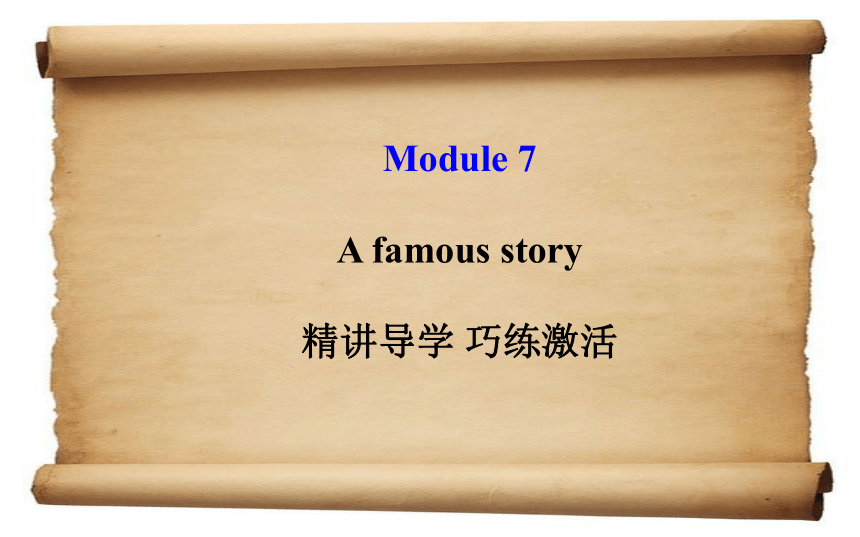
|
|
| 格式 | zip | ||
| 文件大小 | 2.6MB | ||
| 资源类型 | 教案 | ||
| 版本资源 | 外研版 | ||
| 科目 | 英语 | ||
| 更新时间 | 2014-11-22 00:00:00 | ||
图片预览


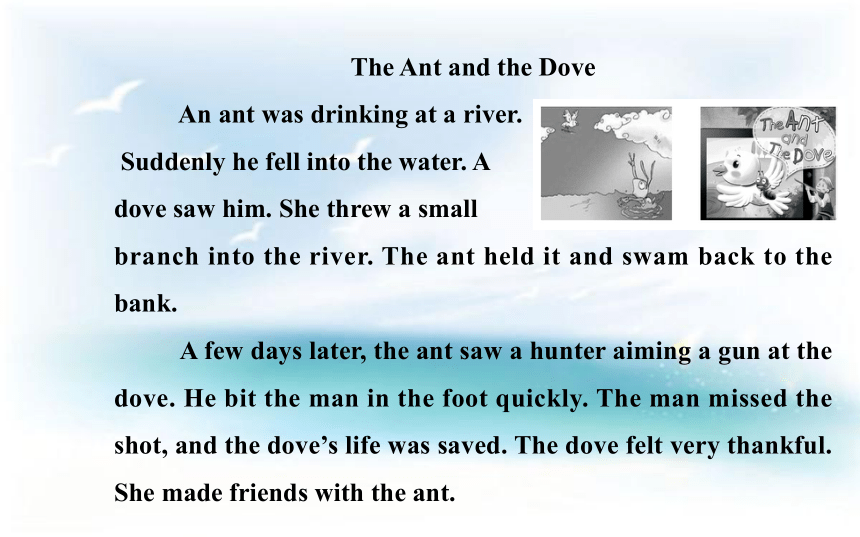
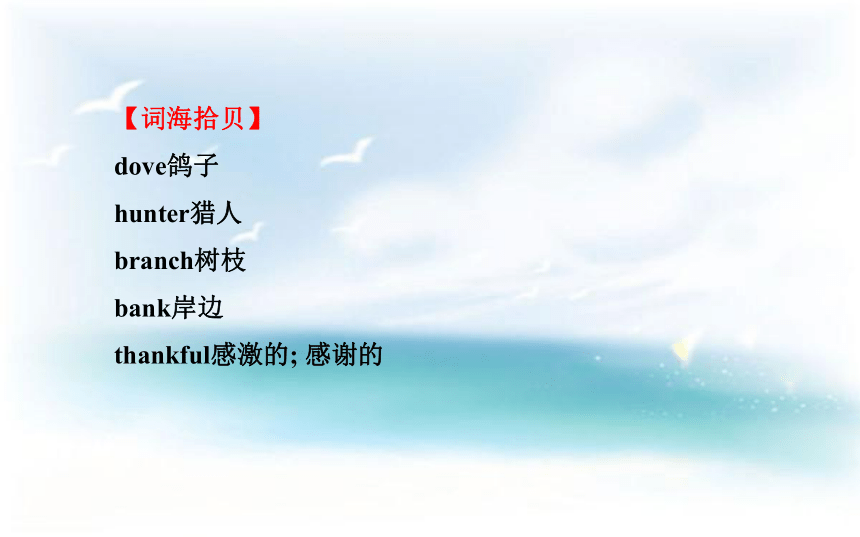

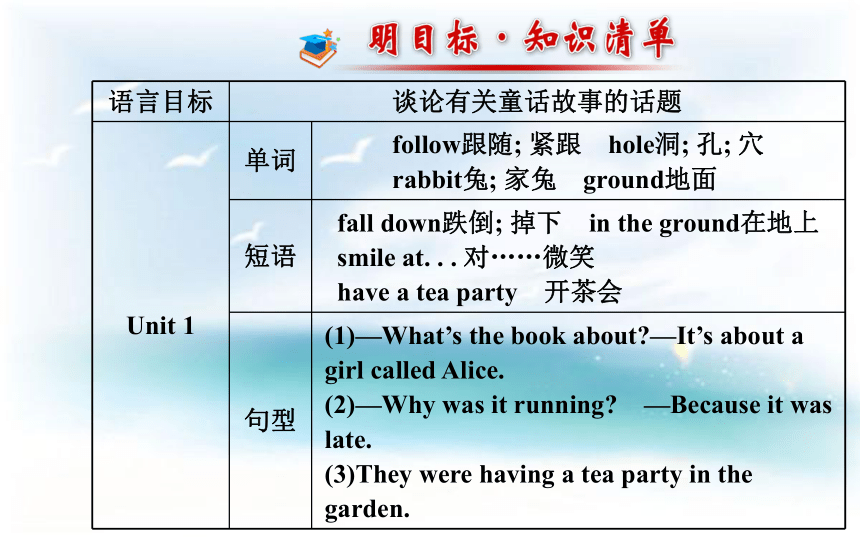
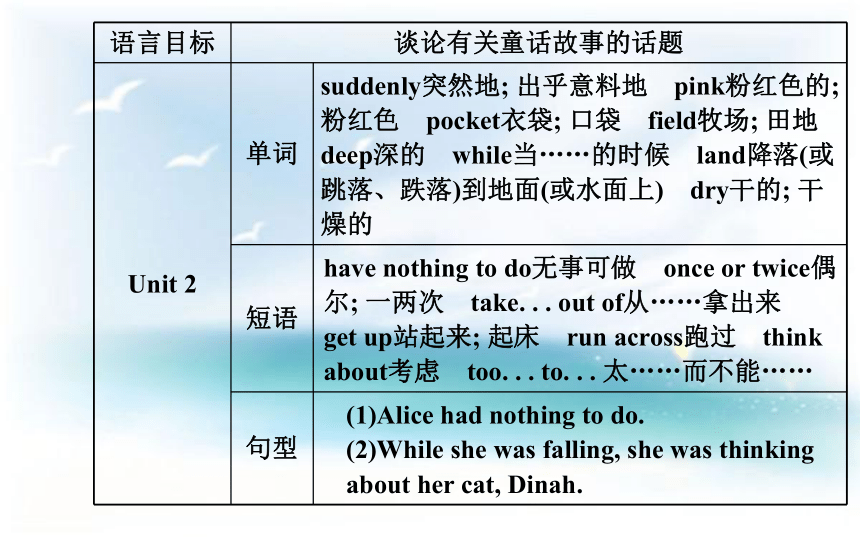
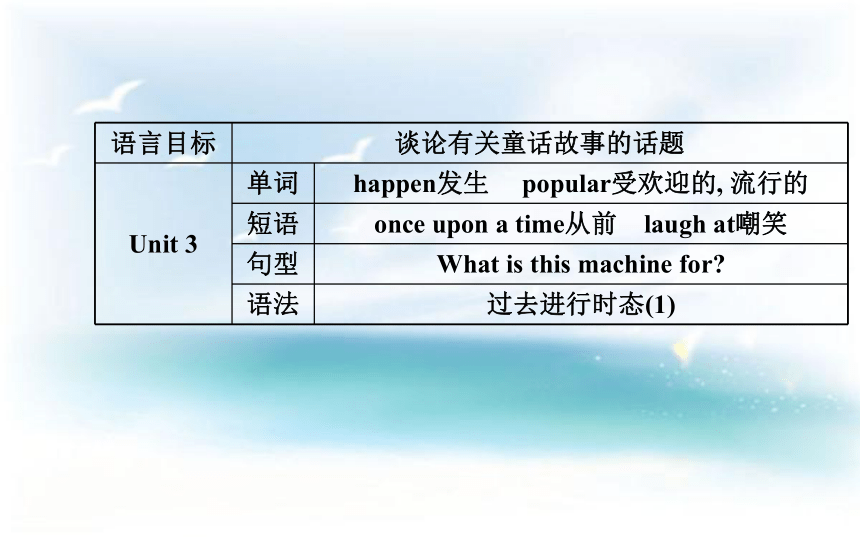
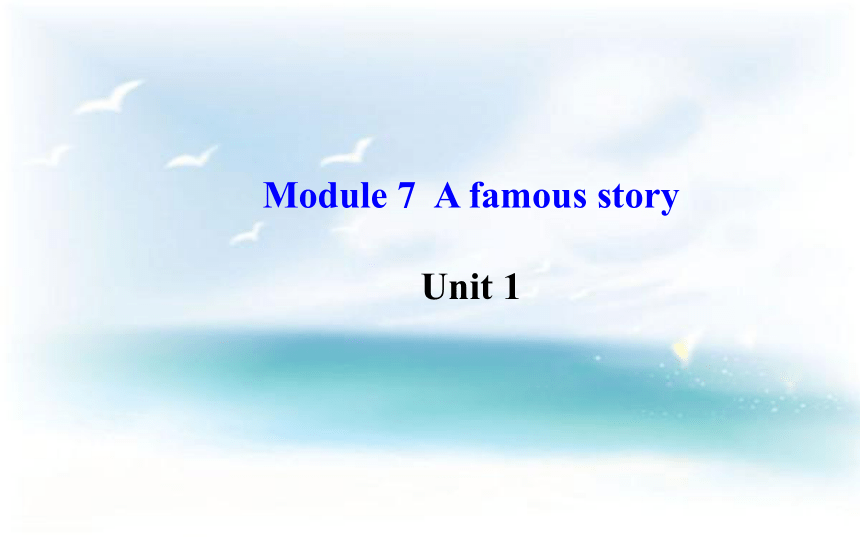
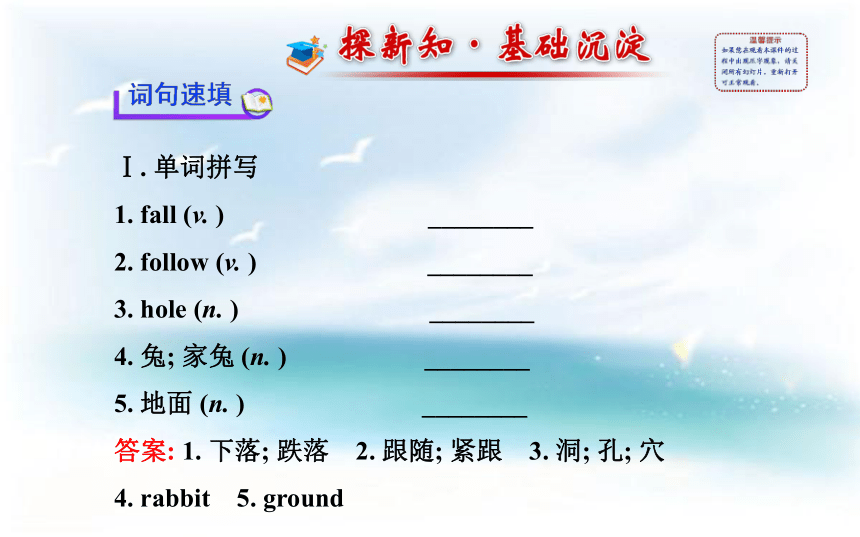
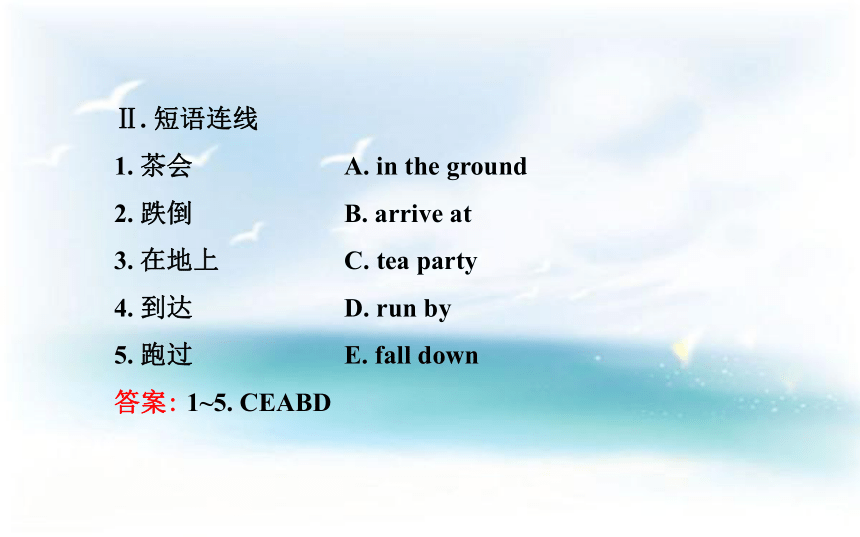
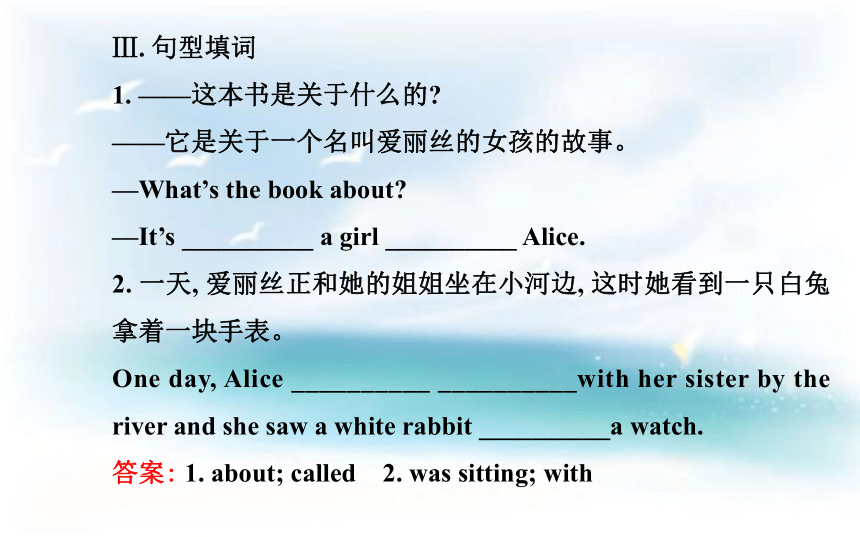
文档简介
课件91张PPT。Module 7
A famous story
精讲导学 巧练激活【导语】不要忽视小东西的力量, 关键时刻任何力量都会起到至关重要的作用。The Ant and the Dove
An ant was drinking at a river.
Suddenly he fell into the water. A
dove saw him. She threw a small
branch into the river. The ant held it and swam back to the bank.
A few days later, the ant saw a hunter aiming a gun at the dove. He bit the man in the foot quickly. The man missed the shot, and the dove’s life was saved. The dove felt very thankful. She made friends with the ant. 【词海拾贝】
dove鸽子
hunter猎人
branch树枝
bank岸边
thankful感激的; 感谢的【我的感悟】
Maybe some friends are not important, but they may give big help when we are in trouble. 有些朋友也许微不足道, 但是在我们身处困境的时候他们也许能提供巨大的帮助。Module 7 A famous story
Unit 1Ⅰ. 单词拼写
1. fall (v. ) ________
2. follow (v. ) ________
3. hole (n. ) ________
4. 兔; 家兔 (n. ) ________
5. 地面 (n. ) ________
答案: 1. 下落; 跌落 2. 跟随; 紧跟 3. 洞; 孔; 穴
4. rabbit 5. groundⅡ. 短语连线
1. 茶会 A. in the ground
2. 跌倒 B. arrive at
3. 在地上 C. tea party
4. 到达 D. run by
5. 跑过 E. fall down
答案: 1~5. CEABDⅢ. 句型填词
1. ——这本书是关于什么的?
——它是关于一个名叫爱丽丝的女孩的故事。
—What’s the book about?
—It’s __________ a girl __________ Alice.
2. 一天, 爱丽丝正和她的姐姐坐在小河边, 这时她看到一只白兔拿着一块手表。
One day, Alice __________ __________with her sister by the river and she saw a white rabbit __________a watch.
答案: 1. about; called 2. was sitting; with 3. ——它为什么在跑?
——因为天太晚了。
—Why __________ it __________ ?
—Because it was late.
4. 它正坐在一棵树上并朝大家微笑。
It was sitting __________ a tree and __________ __________ everyone.
5. 为了看看你是否还记得这个故事!
_________ ________ __________ you remember the story!
答案: 3. was; running 4. in; smiling at 5. To see if 1. One day Alice was sitting with her
sister by the river.
She was playing a strange game.
_________________________________________________
答案: 过去进行时, 谓语动词的构成: was/were+v. -ing。2. To see if you remember the story!
I remember giving you money, so remember to buy some food on your way home.
______________________________________________________
答案: remember doing sth. 记得做过某事; remember to do sth. 记得要做某事。1. in a tree在树上
【语境领悟】
*It was sitting in a tree and smiling at everyone.
它正坐在一棵树上并朝大家微笑。
*The leaves on a tree start to fall in autumn.
树上的树叶在秋天开始飘落。【自主归纳】“在树上”的不同表达【学以致用】
There’re lots of apples ______ the apple trees and many farmers are picking them ______ the trees.
A. on; on B. in; in
C. on; in D. in; on2. arrive at到达
【语境领悟】
*Then Alice arrived at the March Hare’s house.
然后爱丽丝来到三月兔的家里。
*When did Mr. Wang get to our school yesterday?
王先生昨天什么时候到达我们学校的? 【自主归纳】 arrive/get to的用法辨析答案: in; at 【学以致用】
(2014·聊城实验中学质检)Do you know when the Whites will ______ the airport?
A. get B. arrive in
C. reach to D. arrive atⅠ. 单项选择
1. The movie is about a woman ______ Lin Na.
A. call B. called C. calls D. calling
2. My father ______ at six o’clock yesterday morning.
A. ran B. is running
C. have run D. was running
3. I’m tired after such a long walk. Let’s have a rest ______ the river.
A. in B. on C. by D. over4. (2014·山东莒南质检)Many buildings and houses in Wenchuan ______ in the earthquake on May 12th, 2008.
A. fall down B. fell down
C. fall in D. fell in
5. (2014·山东诸城树一中学期末)—Look! What’s ______ the tree?
—Oh, a cat.
A. on B. in C. at D. toⅡ. 句型转换
1. The students have piano lessons every day. (用at three yesterday afternoon改为过去进行时态)
The students __________ __________ piano lessons at three yesterday afternoon.
2. Bob was doing his homework at home. (改为否定句)
Bob _________ __________ his homework at home.
答案: 1. were having 2. wasn’t doing3. Susan was reading a storybook when her mother came in. (改为一般疑问句)
__________ Susan __________ a storybook when her mother came in?
4. Daming was playing basketball at this time of last Saturday afternoon. (对画线部分提问)
_________ ___________Daming __________ at this time of last Saturday afternoon?
答案: 3. Was; reading 4. What was; doing5. The officer will get to the small town tomorrow morning. (改为同义句)
The officer will_________ _________ the small town tomorrow morning.
答案: arrive atModule 7 A famous story
Unit 2Ⅰ. 单词拼写
1. pink (adj. ) __________________
2. pocket (n. ) __________________
3. 当……的时候 (conj. ) __________________
4. 牧场; 田地 (n. ) __________________
答案: 1. 粉红色的 2. 衣袋; 口袋 3. while 4. field5. 降落(或跳落、跌落)到地面(v. ) __________________
6. sudden (adj. ) →__________(adv. )突然地;
出乎意料地
7. two (num. ) →________(adv. )两次; 两倍
答案: 5. land 6. suddenly 7. twiceⅡ. 短语互译
1. 偶尔 _________ ___________twice
2. 从……拿出来 take. . . ________ __________
3. think about __________________
4. land on __________________
答案: 1. once or 2. out of 3. 考虑 4. (降)落到……上Ⅲ. 句型填词
1. 爱丽丝正和她的姐姐坐在河边。
Alice __________ ________ ________ her sister by the river.
2. 那没有什么好奇怪的。
There was __________ _________ about that.
3. 爱丽丝无事可做。
Alice had __________ _________ ________.
答案: 1. was sitting with 2. nothing strange 3. nothing to do4. “没有插图也没有对话的书有什么用?”爱丽丝想。
“And __________ is a book__________, ”thought Alice, “__________ pictures __________ conversations?”
5. 她看到它进了地上的一个大兔子洞里。
She saw it ________ __________ a large rabbit hole in the ground.
6. 对她来说, 太黑了而看不到任何东西。
It was _________ dark for her ________ _________ anything.
答案: 4. what; for; without; or 5. go down 6. too; to see1. Then the rabbit took a watch out of
its pocket and looked at it.
She saw it go down a large rabbit hole in the ground.
_________________________________________________
答案: look at是由动词look与介词at组成的词组, 相当于及物动词, 后面可以带宾语, 侧重“看”的动作。see为及物动词, 意思是“看见”, 侧重“看”的结果。 2. “And what is a book for, ”thought
Alice, “without pictures or conversations?”
Sally goes to school without having breakfast.
___________________________________________________
答案: (表否定)没有, 无, 不需。后接名词或v. -ing形式。1. think about 思考;考虑
【语境领悟】
*She was thinking about her cat. 她一直在想着她的猫。
*It’s good to think of future. 考虑未来是有好处的。
*Think over, and you’ll find a way.
仔细考虑一下,你就会有办法的。【自主归纳】think about,think of与think over的区别【学以致用】
选词填空(think of, think about, think over)。
①Mr. Wang is __________ buying a new flat next year.
②Uncle Lei Feng was always __________ others.
③I’ll __________ your suggestion, and give you an answer tomorrow.
答案: ①thinking about ②thinking of ③think over2. “And what is a book for,”thought Alice, “without pictures or conversations? ”
“没有插图也没有对话的书有什么用?”爱丽丝想。
【句型剖析】
What. . . for? 意为“……有什么用?为何……?”是不理解对方的动机或询问对方的目的或用意时的用语。相当于why。【妙辨异同】What. . . for?与Why. . . ?的用法辨析【学以致用】
①(2013·扬州中考)—I’ll go to the USA next month.
—______for?
A. Why B. How C. Which D. What
②(2013·宜昌中考)—______is the street crowded with so many people?
—Because they are waiting to watch the boat races.
A. Why B. Where C. How D. Who3. While she was falling, she was thinking about her cat, Dinah.
当她下落的时候,她一直在想着她的猫,黛娜。
【句型剖析】
此句是一个由while引导的时间状语从句,其中while用作连词,意为“当……的时候”,主句和从句均为进行时态,表示两个动作同时在进行中。【妙辨异同】while/when的用法辨析【学以致用】
①(2013·广东中考)Today’s young people can’t live without smart phones. They keep their hands on the phones wherever they go, even while they ______meals.
A. had B. will have
C. are having D. were having
②(2013·菏泽中考)______the children have fun, parents can take dance lessons on the beach.
A. When B. If C. While D. Once③(2013·雅安中考)Amy was reading a book ______ I came in.
A. when B. while
C. because D. though4. It was too dark for her to see anything.
天太黑了,她什么也看不清。
【句型剖析】“too. . . to”三考点
(1)“too+adj. /adv. +to do sth. ”句型,意为“太……而不能做某事”。(2)“too + adj. /adv. +to do sth. ”句型中的动词不定式前加for sb. /sth. 时,sb. /sth. 是动词不定式的逻辑主语。例如:
This English book is too difficult for me to read.
这本英语书太难了, 我读不懂。
(3)“too + adj. /adv. +to do sth. ”句型,可以转化为not. . . enough to和so/such. . . that. . . 句型,此时that从句用否定结构。例如:
He is too young to do the work. =He is so young that he cannot do the work. =He is not old enough to do the work. 他太年轻了,不能做这项工作。【学以致用】
(2013·广州中考)踢完足球后, 他太兴奋了睡不着。
After the football game, he was __________ excited __________ sleep.
答案: too; to【备选要点】
1. nothing pron. 没有什么;没有东西
【语境领悟】
*Alice had nothing to do. 爱丽丝无事可做。
*There was nothing strange about that.
那没有什么奇怪的。【自主归纳】(1)nothing为不定代词,意为“没有什么”,表示否定意义,相当于not. . . anything。
(2)形容词作定语修饰nothing, anything, something等不定代词时,形容词要_____(后置/前置)。
例如:
①I have something important to tell you,Lily.
我有一些重要的事情要告诉你, 莉莉。
②Do you want anything delicious to eat?
你想吃一些可口的东西吗?
答案: 后置 【温馨提示】当不定代词nothing, something, anything等作主语时,谓语动词用单数形式。【学以致用】
①(2013·莱芜中考)A smile costs______, but gives so much.
A. something B. anything
C. nothing D. everything②We all know the saying that nothing ______ impossible if you put your heart into it.
A. was B. were
C. is D. are
【解析】选C。考查不定代词的用法。something, anything, nothing等作主语时, 谓语动词用单数形式。又因主句谓语动词用know。故选C。2. with prep. 带有;具有
【语境领悟】
*Suddenly a white rabbit with pink eyes ran by.
突然一只有粉色眼睛的白兔跑过去。
*Alice was sitting with her sister by the river and her sister was reading a book.
爱丽丝正和姐姐坐在河边,姐姐在看书。
*The teacher came into the classroom with a smile on her face. 老师面带微笑地走进教室。【自主归纳】with的用法
(1)“用……”,表示使用工具、手段等。例如:
We can walk with our legs and feet. 我们用腿脚行走。
(2)“和……在一起”,表示伴随。例如:
Could you go to a movie with me? 你能和我一起去看电影吗?
(3)“在……方面”。例如:
Kate helps me with my English.
(4)“随着,与……同时”。例如:With these words, he left the room. 说着这些话他离开了房间。【学以致用】
(2013·连云港中考)—I’d like a cup of black coffee. What about you, Maggie?
—I prefer coffee ______ sugar.
A. than B. for C. with D. toⅠ. 用所给词的适当形式填空
1. My father _________ still ________ (sleep) at 8 last Saturday morning.
2. I saw Wang Hai_________ (swim) across the river just now.
3. __________ (sudden), everyone started shouting and singing happily.
4. Daming was thinking about _________ (travel) to Beijing.
5. I heard Jane _________ (play) the piano in the room after school every day.
答案: 1. was; sleeping 2. swim 3. Suddenly 4. travelling
5. playⅡ. 完成句子
1. (2014·天津河西区期末)我妈妈偶尔步行去上班。
________ __________ __________ my mother goes to work on foot.
2. 你为什么要去巴黎?
__________ are you going to Paris __________?
3. 报纸上没什么有趣的新闻。
There is _________ __________ in the newspaper.
答案: 1. Once or twice 2. What; for 3. nothing interesting4. 我今天无事可做, 因此我可以陪你去看电影。
I have _________ _________ _________ today so I can go to the cinema with you.
5. (2013·黄石中考)父母经常说我们太年轻, 不能自己做决定。
Our parents often say that we are __________ young __________ decide for ourselves.
答案: 4. nothing to do 5. too; toModule 7 A famous story
Unit 3stop doing sth. 停止做某事
【语境领悟】
*Stop singing,Mouse!
停止唱歌, 老鼠!
*It’s better to stop to have a rest for a while when we feel tired. 当我们感到累的时候,最好停下来休息一会儿。
*We should plant more trees to stop the wind from blowing the soil away.
我们应该多种树来阻止大风刮走土壤。【自主归纳】stop的常用结构
(1) stop doing sth. 停止做某事,强调停止正在做的事情
(2)stop to do sth. 停下来去做某事(停下正在做的事情去做另一件事情)
(3)stop sb. /sth. from doing sth. 阻止某人/某事做某事【学以致用】
(2013·滨州中考)I have finished my homework, Mom. May I stop __________ (have) a rest?
答案: to have过去进行时态(1)
【语境领悟】
仔细观察例句,体会过去进行时的构成及用法。
1. One day, Alice was sitting with her sister by the river.
2. They were having a tea party in the garden.
3. Why was he running?
4. While she was falling, she was thinking about her cat, Dinah. 【知识构建】
(一)过去进行时态的三要素 (二)过去进行时态的四种句式(三)一般过去时和过去进行时的区别
相同点: 两者都表示过去发生的动作。
不同点: 一般过去时态表示在过去已经完成的动作; 过去进行时态表示过去正在进行的动作。【学以致用】
用所给动词的适当形式填空。
1. —I called you but no one answered yesterday afternoon.
—Oh, sorry. I ________(have) a tea party with my friends.
2. What ________ they _________(do) at ten o’clock last night?
3. I was making some cards while my friends _________ (talk) happily.
4. Linda ______(not learn) to play the piano at four o’clock yesterday afternoon.
答案: 1. was having 2. were; doing 3. were talking
4. wasn’t learning5. —_________ you ________ (play) the piano at this time yesterday?
—Yes, I__________.
6. Yesterday my mother _________ (cook) while my father was watching TV.
7. —I was at the cinema at nine o’clock yesterday evening. What about you?
—I _________(do) my homework at home.
8. I__________ (listen) to music in the garden when my cousin came to see me.
答案: 5. Were; playing; was 6. was cooking
7. was doing 8. was listening 请你根据以下提示用英语讲一个故事。
从前, 有个小女孩, 名叫小花, 她没有家人, 所以整日都很伤心。但她有一只可爱的猫, 这只猫会唱歌。一个星期六的早晨, 小花去市场时, 这只猫唱了一首《十只小白兔》。有个人正好骑马路过, 听了这首歌后, 便买下了这只猫。小花得到钱, 为自己买了几本故事书, 她高兴极了, 脸上露出了笑容。
要求: 1. 词数80~100个;
2. 必须包含以上提示内容, 语句通顺, 意思连贯, 可适当发挥。【思路点拨】
1. 体裁: 记叙文。
2. 人称: 第三人称。
3. 时态: 一般过去时和过去进行时。【写作模板】【妙笔成篇】
_____________________________________________________________________________________________________________________________________________________________________________________________________________________________________________________________________________【参考范文】
Long time ago, there was a little girl called Xiaohua. She had no family, so she was very sad all day. But she had a lovely cat. It could sing songs. One Saturday morning, when she was going to the market, the cat sang a song. “One little, two little, three little rabbits; four little, five little, six little rabbits; seven little, eight little, nine little rabbits, ten little rabbits. ”
At that moment, a man was riding a horse, and when he went past, he heard the beautiful song. He got off his horse and bought the cat. After Xiaohua got the money, she bought herself some storybooks. She was very happy, and there was a big smile on her face. Ⅰ. 用所给词的适当形式填空
1. Students _________(have) a tea party at 9: 30 am yesterday.
2. What________ your brother _________(do) at this time last Sunday?
3. There are some boys _________(stand) on the playground.
4. It’s eight o’clock now. We don’t have time _________(go) shopping to buy something.
5. Stop _________(talk)! The film has begun.
答案: 1. were having 2. was; doing 3. standing 4. to go
5. talkingⅡ. 完成句子
1. 从前有一位老人住在一座山里。
__________ __________ ___________ _________, there was an old man living in a mountain.
2. 玛丽不能参加会议, 所以她的助手代她出席。
Mary couldn’t attend the meeting, so her assistant _________ ___________ __________ __________her.
答案: 1. Once upon a time 2. took the place of3. 在我去学校的路上, 我遇到了詹妮。我们非常激动。
__________ _________ _________ _________ school, I came across Jenny. We were very excited.
4. ——这台机器是用来做什么的?
—__________is the machine__________?
——它是用来做面条的。
—It’s for making noodles.
答案: 3. On my way to 4. What; for 5. 考上名牌大学对我们来说是不容易的。
It’s not easy __________ us _________ ___________ __________ a famous university.
答案: for; to go to模块复习课
Module 7Ⅰ. 词汇速记
1. 跟随; 紧跟(v. ) __________________
2. 洞; 孔; 穴(n. ) __________________
3. 兔; 家兔(n. ) __________________
4. 地面(n. ) __________________
5. 粉红色的; 粉红色(adj. &n. ) __________________
6. 衣袋; 口袋(n. ) __________________
答案: 1. follow 2. hole 3. rabbit 4. ground 5. pink
6. pocket 7. 牧场; 田地(n. ) __________________
8. 深的(adj. ) __________________
9. 当……的时候(conj. ) __________________
10. 降落到地面(v. ) __________________
11. 干的; 干燥的(adj. ) __________________
12. two (num. ) →__________(adv. )两次
13. sudden (adj. ) →__________(adv. )突然地; 出乎意料地
答案: 7. field 8. deep 9. while 10. land 11. dry
12. twice 13. suddenlyⅡ. 短语互译
1. 跌落 __________down
2. 到达 arrive__________
3. 偶尔 once_________ ___________
4. think about __________________
5. take. . . out of __________________
6. once upon a time __________________
答案: 1. fall 2. at/in 3. or twice 4. 考虑 5. 从……拿出来 6. 从前Ⅲ. 句型攻关
1. 那时大明正在照看他的妹妹。
Daming _________ _________ after his sister at that time.
2. 我们看到老年人正在广场锻炼身体。
We saw the old _________ _________ in the square.
3. 李先生去南京做什么?
__________ does Mr. Li go to Nanjing __________?
4. 布朗先生太忙了, 没时间照顾他的小孩。
Mr. Brown is_________ busy _________take care of his baby.
答案: 1. was looking 2. taking exercise 3. What; for
4. too; to 5. 很多老人退休后无事可做。
Many old people _________ ____________ ____________ after they retire.
6. 你能听到有人在拉小提琴吗?
Can you __________ someone __________ the violin?
7. 当看到一只可爱的小兔子时, 小女孩不哭了。
The girl __________ __________ when she saw a lovely little rabbit.
答案: 5. have nothing to do 6. hear; playing
7. stopped cryingⅣ. 语法专练
(Ⅰ)用所给动词的适当形式填空。
1. Mr Wang __________ (clean) his room at eight o’clock yesterday morning.
2. I__________ (mend) my bike when they rang me up.
3. The children__________ (dance) under the tree at that time.
4. While they__________ (do) their homework, a bird flew into the room.
5. The singer__________ (give) a concert at this time yesterday.
答案: 1. was cleaning 2. was mending 3. were dancing
4. were doing 5. was giving(Ⅱ)句型转换
1. I was taking photos by the river at that moment. (改为一般疑问句, 并作否定回答)
—__________ you __________ photos by the river at that moment?
—__________, I__________.
2. My grandparents were listening to Beijing Opera in the living room. (改为否定句)
My grandparents __________ __________ to Beijing Opera in the living room.
答案: 1. Were; taking; No; wasn’t 2. weren’t listening3. The young man was sleeping when the earthquake happened. (对画线部分提问)
__________ __________the young man __________ when the earthquake happened?
答案: What was; doingⅤ. 真题体验
1. (2013·莱芜中考)—I didn’t see you at the meeting yesterday. Why?
—I ______ for an important telephone call at that moment.
A. wait B. waited
C. am waiting D. was waiting
【解析】选D。考查时态。句意: ——昨天会议上我没看见你, 为什么?——在那时, 我正等一个重要的电话。根据句意选择过去进行时, 故选D。2. (2013·衢州中考)—Sam, what will the weather be like tomorrow?
—Sorry, Mum, I didn’t watch the weather forecast just now; I ________ a football match.
A. was watching B. am watching
C. would watch D. will watch
【解析】选A。考查时态。句意: ——Sam, 明天天气怎么样?
——对不起, 妈妈, 我刚才没有听天气预报, 我那时在看一场足球赛。根据句意可以确定后面横线上用过去进行时态。故选A。3. (2013·黄石中考)Seeing their teacher ______into the classroom, they stopped ______at once.
A. walk; telling B. entering; to speak
C. enter; to tell D. walking; talking
【解析】选D。考查非谓语动词和固定搭配。see sb. doing sth. 看见某人正在做某事, walk into the classroom=enter the classroom; stop doing sth. 意为“停止做某事”。句意: 看见他们的老师正走进教室, 他们马上停止讲话。故选D。4. (2013·泰安中考)—Why is Linlin practicing speaking English?
——______abroad for further study.
A. Go B. Gone C. To go D. Goes
【解析】选C。考查非谓语动词。句意: ——琳琳为什么练习说英语?——为了出国进修。动词不定式在此处作目的状语。故选C。5. (2013·湛江中考)我太累了, 什么都想不起来了。
I’m __________ _________ __________ think of anything.
答案: too tired to
A famous story
精讲导学 巧练激活【导语】不要忽视小东西的力量, 关键时刻任何力量都会起到至关重要的作用。The Ant and the Dove
An ant was drinking at a river.
Suddenly he fell into the water. A
dove saw him. She threw a small
branch into the river. The ant held it and swam back to the bank.
A few days later, the ant saw a hunter aiming a gun at the dove. He bit the man in the foot quickly. The man missed the shot, and the dove’s life was saved. The dove felt very thankful. She made friends with the ant. 【词海拾贝】
dove鸽子
hunter猎人
branch树枝
bank岸边
thankful感激的; 感谢的【我的感悟】
Maybe some friends are not important, but they may give big help when we are in trouble. 有些朋友也许微不足道, 但是在我们身处困境的时候他们也许能提供巨大的帮助。Module 7 A famous story
Unit 1Ⅰ. 单词拼写
1. fall (v. ) ________
2. follow (v. ) ________
3. hole (n. ) ________
4. 兔; 家兔 (n. ) ________
5. 地面 (n. ) ________
答案: 1. 下落; 跌落 2. 跟随; 紧跟 3. 洞; 孔; 穴
4. rabbit 5. groundⅡ. 短语连线
1. 茶会 A. in the ground
2. 跌倒 B. arrive at
3. 在地上 C. tea party
4. 到达 D. run by
5. 跑过 E. fall down
答案: 1~5. CEABDⅢ. 句型填词
1. ——这本书是关于什么的?
——它是关于一个名叫爱丽丝的女孩的故事。
—What’s the book about?
—It’s __________ a girl __________ Alice.
2. 一天, 爱丽丝正和她的姐姐坐在小河边, 这时她看到一只白兔拿着一块手表。
One day, Alice __________ __________with her sister by the river and she saw a white rabbit __________a watch.
答案: 1. about; called 2. was sitting; with 3. ——它为什么在跑?
——因为天太晚了。
—Why __________ it __________ ?
—Because it was late.
4. 它正坐在一棵树上并朝大家微笑。
It was sitting __________ a tree and __________ __________ everyone.
5. 为了看看你是否还记得这个故事!
_________ ________ __________ you remember the story!
答案: 3. was; running 4. in; smiling at 5. To see if 1. One day Alice was sitting with her
sister by the river.
She was playing a strange game.
_________________________________________________
答案: 过去进行时, 谓语动词的构成: was/were+v. -ing。2. To see if you remember the story!
I remember giving you money, so remember to buy some food on your way home.
______________________________________________________
答案: remember doing sth. 记得做过某事; remember to do sth. 记得要做某事。1. in a tree在树上
【语境领悟】
*It was sitting in a tree and smiling at everyone.
它正坐在一棵树上并朝大家微笑。
*The leaves on a tree start to fall in autumn.
树上的树叶在秋天开始飘落。【自主归纳】“在树上”的不同表达【学以致用】
There’re lots of apples ______ the apple trees and many farmers are picking them ______ the trees.
A. on; on B. in; in
C. on; in D. in; on2. arrive at到达
【语境领悟】
*Then Alice arrived at the March Hare’s house.
然后爱丽丝来到三月兔的家里。
*When did Mr. Wang get to our school yesterday?
王先生昨天什么时候到达我们学校的? 【自主归纳】 arrive/get to的用法辨析答案: in; at 【学以致用】
(2014·聊城实验中学质检)Do you know when the Whites will ______ the airport?
A. get B. arrive in
C. reach to D. arrive atⅠ. 单项选择
1. The movie is about a woman ______ Lin Na.
A. call B. called C. calls D. calling
2. My father ______ at six o’clock yesterday morning.
A. ran B. is running
C. have run D. was running
3. I’m tired after such a long walk. Let’s have a rest ______ the river.
A. in B. on C. by D. over4. (2014·山东莒南质检)Many buildings and houses in Wenchuan ______ in the earthquake on May 12th, 2008.
A. fall down B. fell down
C. fall in D. fell in
5. (2014·山东诸城树一中学期末)—Look! What’s ______ the tree?
—Oh, a cat.
A. on B. in C. at D. toⅡ. 句型转换
1. The students have piano lessons every day. (用at three yesterday afternoon改为过去进行时态)
The students __________ __________ piano lessons at three yesterday afternoon.
2. Bob was doing his homework at home. (改为否定句)
Bob _________ __________ his homework at home.
答案: 1. were having 2. wasn’t doing3. Susan was reading a storybook when her mother came in. (改为一般疑问句)
__________ Susan __________ a storybook when her mother came in?
4. Daming was playing basketball at this time of last Saturday afternoon. (对画线部分提问)
_________ ___________Daming __________ at this time of last Saturday afternoon?
答案: 3. Was; reading 4. What was; doing5. The officer will get to the small town tomorrow morning. (改为同义句)
The officer will_________ _________ the small town tomorrow morning.
答案: arrive atModule 7 A famous story
Unit 2Ⅰ. 单词拼写
1. pink (adj. ) __________________
2. pocket (n. ) __________________
3. 当……的时候 (conj. ) __________________
4. 牧场; 田地 (n. ) __________________
答案: 1. 粉红色的 2. 衣袋; 口袋 3. while 4. field5. 降落(或跳落、跌落)到地面(v. ) __________________
6. sudden (adj. ) →__________(adv. )突然地;
出乎意料地
7. two (num. ) →________(adv. )两次; 两倍
答案: 5. land 6. suddenly 7. twiceⅡ. 短语互译
1. 偶尔 _________ ___________twice
2. 从……拿出来 take. . . ________ __________
3. think about __________________
4. land on __________________
答案: 1. once or 2. out of 3. 考虑 4. (降)落到……上Ⅲ. 句型填词
1. 爱丽丝正和她的姐姐坐在河边。
Alice __________ ________ ________ her sister by the river.
2. 那没有什么好奇怪的。
There was __________ _________ about that.
3. 爱丽丝无事可做。
Alice had __________ _________ ________.
答案: 1. was sitting with 2. nothing strange 3. nothing to do4. “没有插图也没有对话的书有什么用?”爱丽丝想。
“And __________ is a book__________, ”thought Alice, “__________ pictures __________ conversations?”
5. 她看到它进了地上的一个大兔子洞里。
She saw it ________ __________ a large rabbit hole in the ground.
6. 对她来说, 太黑了而看不到任何东西。
It was _________ dark for her ________ _________ anything.
答案: 4. what; for; without; or 5. go down 6. too; to see1. Then the rabbit took a watch out of
its pocket and looked at it.
She saw it go down a large rabbit hole in the ground.
_________________________________________________
答案: look at是由动词look与介词at组成的词组, 相当于及物动词, 后面可以带宾语, 侧重“看”的动作。see为及物动词, 意思是“看见”, 侧重“看”的结果。 2. “And what is a book for, ”thought
Alice, “without pictures or conversations?”
Sally goes to school without having breakfast.
___________________________________________________
答案: (表否定)没有, 无, 不需。后接名词或v. -ing形式。1. think about 思考;考虑
【语境领悟】
*She was thinking about her cat. 她一直在想着她的猫。
*It’s good to think of future. 考虑未来是有好处的。
*Think over, and you’ll find a way.
仔细考虑一下,你就会有办法的。【自主归纳】think about,think of与think over的区别【学以致用】
选词填空(think of, think about, think over)。
①Mr. Wang is __________ buying a new flat next year.
②Uncle Lei Feng was always __________ others.
③I’ll __________ your suggestion, and give you an answer tomorrow.
答案: ①thinking about ②thinking of ③think over2. “And what is a book for,”thought Alice, “without pictures or conversations? ”
“没有插图也没有对话的书有什么用?”爱丽丝想。
【句型剖析】
What. . . for? 意为“……有什么用?为何……?”是不理解对方的动机或询问对方的目的或用意时的用语。相当于why。【妙辨异同】What. . . for?与Why. . . ?的用法辨析【学以致用】
①(2013·扬州中考)—I’ll go to the USA next month.
—______for?
A. Why B. How C. Which D. What
②(2013·宜昌中考)—______is the street crowded with so many people?
—Because they are waiting to watch the boat races.
A. Why B. Where C. How D. Who3. While she was falling, she was thinking about her cat, Dinah.
当她下落的时候,她一直在想着她的猫,黛娜。
【句型剖析】
此句是一个由while引导的时间状语从句,其中while用作连词,意为“当……的时候”,主句和从句均为进行时态,表示两个动作同时在进行中。【妙辨异同】while/when的用法辨析【学以致用】
①(2013·广东中考)Today’s young people can’t live without smart phones. They keep their hands on the phones wherever they go, even while they ______meals.
A. had B. will have
C. are having D. were having
②(2013·菏泽中考)______the children have fun, parents can take dance lessons on the beach.
A. When B. If C. While D. Once③(2013·雅安中考)Amy was reading a book ______ I came in.
A. when B. while
C. because D. though4. It was too dark for her to see anything.
天太黑了,她什么也看不清。
【句型剖析】“too. . . to”三考点
(1)“too+adj. /adv. +to do sth. ”句型,意为“太……而不能做某事”。(2)“too + adj. /adv. +to do sth. ”句型中的动词不定式前加for sb. /sth. 时,sb. /sth. 是动词不定式的逻辑主语。例如:
This English book is too difficult for me to read.
这本英语书太难了, 我读不懂。
(3)“too + adj. /adv. +to do sth. ”句型,可以转化为not. . . enough to和so/such. . . that. . . 句型,此时that从句用否定结构。例如:
He is too young to do the work. =He is so young that he cannot do the work. =He is not old enough to do the work. 他太年轻了,不能做这项工作。【学以致用】
(2013·广州中考)踢完足球后, 他太兴奋了睡不着。
After the football game, he was __________ excited __________ sleep.
答案: too; to【备选要点】
1. nothing pron. 没有什么;没有东西
【语境领悟】
*Alice had nothing to do. 爱丽丝无事可做。
*There was nothing strange about that.
那没有什么奇怪的。【自主归纳】(1)nothing为不定代词,意为“没有什么”,表示否定意义,相当于not. . . anything。
(2)形容词作定语修饰nothing, anything, something等不定代词时,形容词要_____(后置/前置)。
例如:
①I have something important to tell you,Lily.
我有一些重要的事情要告诉你, 莉莉。
②Do you want anything delicious to eat?
你想吃一些可口的东西吗?
答案: 后置 【温馨提示】当不定代词nothing, something, anything等作主语时,谓语动词用单数形式。【学以致用】
①(2013·莱芜中考)A smile costs______, but gives so much.
A. something B. anything
C. nothing D. everything②We all know the saying that nothing ______ impossible if you put your heart into it.
A. was B. were
C. is D. are
【解析】选C。考查不定代词的用法。something, anything, nothing等作主语时, 谓语动词用单数形式。又因主句谓语动词用know。故选C。2. with prep. 带有;具有
【语境领悟】
*Suddenly a white rabbit with pink eyes ran by.
突然一只有粉色眼睛的白兔跑过去。
*Alice was sitting with her sister by the river and her sister was reading a book.
爱丽丝正和姐姐坐在河边,姐姐在看书。
*The teacher came into the classroom with a smile on her face. 老师面带微笑地走进教室。【自主归纳】with的用法
(1)“用……”,表示使用工具、手段等。例如:
We can walk with our legs and feet. 我们用腿脚行走。
(2)“和……在一起”,表示伴随。例如:
Could you go to a movie with me? 你能和我一起去看电影吗?
(3)“在……方面”。例如:
Kate helps me with my English.
(4)“随着,与……同时”。例如:With these words, he left the room. 说着这些话他离开了房间。【学以致用】
(2013·连云港中考)—I’d like a cup of black coffee. What about you, Maggie?
—I prefer coffee ______ sugar.
A. than B. for C. with D. toⅠ. 用所给词的适当形式填空
1. My father _________ still ________ (sleep) at 8 last Saturday morning.
2. I saw Wang Hai_________ (swim) across the river just now.
3. __________ (sudden), everyone started shouting and singing happily.
4. Daming was thinking about _________ (travel) to Beijing.
5. I heard Jane _________ (play) the piano in the room after school every day.
答案: 1. was; sleeping 2. swim 3. Suddenly 4. travelling
5. playⅡ. 完成句子
1. (2014·天津河西区期末)我妈妈偶尔步行去上班。
________ __________ __________ my mother goes to work on foot.
2. 你为什么要去巴黎?
__________ are you going to Paris __________?
3. 报纸上没什么有趣的新闻。
There is _________ __________ in the newspaper.
答案: 1. Once or twice 2. What; for 3. nothing interesting4. 我今天无事可做, 因此我可以陪你去看电影。
I have _________ _________ _________ today so I can go to the cinema with you.
5. (2013·黄石中考)父母经常说我们太年轻, 不能自己做决定。
Our parents often say that we are __________ young __________ decide for ourselves.
答案: 4. nothing to do 5. too; toModule 7 A famous story
Unit 3stop doing sth. 停止做某事
【语境领悟】
*Stop singing,Mouse!
停止唱歌, 老鼠!
*It’s better to stop to have a rest for a while when we feel tired. 当我们感到累的时候,最好停下来休息一会儿。
*We should plant more trees to stop the wind from blowing the soil away.
我们应该多种树来阻止大风刮走土壤。【自主归纳】stop的常用结构
(1) stop doing sth. 停止做某事,强调停止正在做的事情
(2)stop to do sth. 停下来去做某事(停下正在做的事情去做另一件事情)
(3)stop sb. /sth. from doing sth. 阻止某人/某事做某事【学以致用】
(2013·滨州中考)I have finished my homework, Mom. May I stop __________ (have) a rest?
答案: to have过去进行时态(1)
【语境领悟】
仔细观察例句,体会过去进行时的构成及用法。
1. One day, Alice was sitting with her sister by the river.
2. They were having a tea party in the garden.
3. Why was he running?
4. While she was falling, she was thinking about her cat, Dinah. 【知识构建】
(一)过去进行时态的三要素 (二)过去进行时态的四种句式(三)一般过去时和过去进行时的区别
相同点: 两者都表示过去发生的动作。
不同点: 一般过去时态表示在过去已经完成的动作; 过去进行时态表示过去正在进行的动作。【学以致用】
用所给动词的适当形式填空。
1. —I called you but no one answered yesterday afternoon.
—Oh, sorry. I ________(have) a tea party with my friends.
2. What ________ they _________(do) at ten o’clock last night?
3. I was making some cards while my friends _________ (talk) happily.
4. Linda ______(not learn) to play the piano at four o’clock yesterday afternoon.
答案: 1. was having 2. were; doing 3. were talking
4. wasn’t learning5. —_________ you ________ (play) the piano at this time yesterday?
—Yes, I__________.
6. Yesterday my mother _________ (cook) while my father was watching TV.
7. —I was at the cinema at nine o’clock yesterday evening. What about you?
—I _________(do) my homework at home.
8. I__________ (listen) to music in the garden when my cousin came to see me.
答案: 5. Were; playing; was 6. was cooking
7. was doing 8. was listening 请你根据以下提示用英语讲一个故事。
从前, 有个小女孩, 名叫小花, 她没有家人, 所以整日都很伤心。但她有一只可爱的猫, 这只猫会唱歌。一个星期六的早晨, 小花去市场时, 这只猫唱了一首《十只小白兔》。有个人正好骑马路过, 听了这首歌后, 便买下了这只猫。小花得到钱, 为自己买了几本故事书, 她高兴极了, 脸上露出了笑容。
要求: 1. 词数80~100个;
2. 必须包含以上提示内容, 语句通顺, 意思连贯, 可适当发挥。【思路点拨】
1. 体裁: 记叙文。
2. 人称: 第三人称。
3. 时态: 一般过去时和过去进行时。【写作模板】【妙笔成篇】
_____________________________________________________________________________________________________________________________________________________________________________________________________________________________________________________________________________【参考范文】
Long time ago, there was a little girl called Xiaohua. She had no family, so she was very sad all day. But she had a lovely cat. It could sing songs. One Saturday morning, when she was going to the market, the cat sang a song. “One little, two little, three little rabbits; four little, five little, six little rabbits; seven little, eight little, nine little rabbits, ten little rabbits. ”
At that moment, a man was riding a horse, and when he went past, he heard the beautiful song. He got off his horse and bought the cat. After Xiaohua got the money, she bought herself some storybooks. She was very happy, and there was a big smile on her face. Ⅰ. 用所给词的适当形式填空
1. Students _________(have) a tea party at 9: 30 am yesterday.
2. What________ your brother _________(do) at this time last Sunday?
3. There are some boys _________(stand) on the playground.
4. It’s eight o’clock now. We don’t have time _________(go) shopping to buy something.
5. Stop _________(talk)! The film has begun.
答案: 1. were having 2. was; doing 3. standing 4. to go
5. talkingⅡ. 完成句子
1. 从前有一位老人住在一座山里。
__________ __________ ___________ _________, there was an old man living in a mountain.
2. 玛丽不能参加会议, 所以她的助手代她出席。
Mary couldn’t attend the meeting, so her assistant _________ ___________ __________ __________her.
答案: 1. Once upon a time 2. took the place of3. 在我去学校的路上, 我遇到了詹妮。我们非常激动。
__________ _________ _________ _________ school, I came across Jenny. We were very excited.
4. ——这台机器是用来做什么的?
—__________is the machine__________?
——它是用来做面条的。
—It’s for making noodles.
答案: 3. On my way to 4. What; for 5. 考上名牌大学对我们来说是不容易的。
It’s not easy __________ us _________ ___________ __________ a famous university.
答案: for; to go to模块复习课
Module 7Ⅰ. 词汇速记
1. 跟随; 紧跟(v. ) __________________
2. 洞; 孔; 穴(n. ) __________________
3. 兔; 家兔(n. ) __________________
4. 地面(n. ) __________________
5. 粉红色的; 粉红色(adj. &n. ) __________________
6. 衣袋; 口袋(n. ) __________________
答案: 1. follow 2. hole 3. rabbit 4. ground 5. pink
6. pocket 7. 牧场; 田地(n. ) __________________
8. 深的(adj. ) __________________
9. 当……的时候(conj. ) __________________
10. 降落到地面(v. ) __________________
11. 干的; 干燥的(adj. ) __________________
12. two (num. ) →__________(adv. )两次
13. sudden (adj. ) →__________(adv. )突然地; 出乎意料地
答案: 7. field 8. deep 9. while 10. land 11. dry
12. twice 13. suddenlyⅡ. 短语互译
1. 跌落 __________down
2. 到达 arrive__________
3. 偶尔 once_________ ___________
4. think about __________________
5. take. . . out of __________________
6. once upon a time __________________
答案: 1. fall 2. at/in 3. or twice 4. 考虑 5. 从……拿出来 6. 从前Ⅲ. 句型攻关
1. 那时大明正在照看他的妹妹。
Daming _________ _________ after his sister at that time.
2. 我们看到老年人正在广场锻炼身体。
We saw the old _________ _________ in the square.
3. 李先生去南京做什么?
__________ does Mr. Li go to Nanjing __________?
4. 布朗先生太忙了, 没时间照顾他的小孩。
Mr. Brown is_________ busy _________take care of his baby.
答案: 1. was looking 2. taking exercise 3. What; for
4. too; to 5. 很多老人退休后无事可做。
Many old people _________ ____________ ____________ after they retire.
6. 你能听到有人在拉小提琴吗?
Can you __________ someone __________ the violin?
7. 当看到一只可爱的小兔子时, 小女孩不哭了。
The girl __________ __________ when she saw a lovely little rabbit.
答案: 5. have nothing to do 6. hear; playing
7. stopped cryingⅣ. 语法专练
(Ⅰ)用所给动词的适当形式填空。
1. Mr Wang __________ (clean) his room at eight o’clock yesterday morning.
2. I__________ (mend) my bike when they rang me up.
3. The children__________ (dance) under the tree at that time.
4. While they__________ (do) their homework, a bird flew into the room.
5. The singer__________ (give) a concert at this time yesterday.
答案: 1. was cleaning 2. was mending 3. were dancing
4. were doing 5. was giving(Ⅱ)句型转换
1. I was taking photos by the river at that moment. (改为一般疑问句, 并作否定回答)
—__________ you __________ photos by the river at that moment?
—__________, I__________.
2. My grandparents were listening to Beijing Opera in the living room. (改为否定句)
My grandparents __________ __________ to Beijing Opera in the living room.
答案: 1. Were; taking; No; wasn’t 2. weren’t listening3. The young man was sleeping when the earthquake happened. (对画线部分提问)
__________ __________the young man __________ when the earthquake happened?
答案: What was; doingⅤ. 真题体验
1. (2013·莱芜中考)—I didn’t see you at the meeting yesterday. Why?
—I ______ for an important telephone call at that moment.
A. wait B. waited
C. am waiting D. was waiting
【解析】选D。考查时态。句意: ——昨天会议上我没看见你, 为什么?——在那时, 我正等一个重要的电话。根据句意选择过去进行时, 故选D。2. (2013·衢州中考)—Sam, what will the weather be like tomorrow?
—Sorry, Mum, I didn’t watch the weather forecast just now; I ________ a football match.
A. was watching B. am watching
C. would watch D. will watch
【解析】选A。考查时态。句意: ——Sam, 明天天气怎么样?
——对不起, 妈妈, 我刚才没有听天气预报, 我那时在看一场足球赛。根据句意可以确定后面横线上用过去进行时态。故选A。3. (2013·黄石中考)Seeing their teacher ______into the classroom, they stopped ______at once.
A. walk; telling B. entering; to speak
C. enter; to tell D. walking; talking
【解析】选D。考查非谓语动词和固定搭配。see sb. doing sth. 看见某人正在做某事, walk into the classroom=enter the classroom; stop doing sth. 意为“停止做某事”。句意: 看见他们的老师正走进教室, 他们马上停止讲话。故选D。4. (2013·泰安中考)—Why is Linlin practicing speaking English?
——______abroad for further study.
A. Go B. Gone C. To go D. Goes
【解析】选C。考查非谓语动词。句意: ——琳琳为什么练习说英语?——为了出国进修。动词不定式在此处作目的状语。故选C。5. (2013·湛江中考)我太累了, 什么都想不起来了。
I’m __________ _________ __________ think of anything.
答案: too tired to
同课章节目录
- Module 1 How to learn English
- Unit 1 Let's try to speak English as much as possi
- Unit 2 You should smile at her.
- Unit 3 Language in use .
- Module 2 My home town and my country
- Unit 1 It's taller than many other buildings.
- Unit 2 Cambridge is a beautiful city in the east o
- Unit 3 Language in use .
- Module 3 Sports.
- Unit 1 Nothing is more exciting than playing tenni
- Unit 2 This year we training more carefully.
- Unit 3 Language in use .
- Module 4 Planes, ships and trains .
- Unit 1 He lives the farthest from school.
- Unit 2 What is the best way to travel.
- Unit 3 Language in use .
- Module 5 Lao She Teahouse.
- Unit 1 I wanted to see the Beijing Opera.
- Unit 2 It descibes the changes in Chinese society.
- Unit 3 Language in use .
- Module 6 Animals in danger.
- Unit 1 It allows people to get closer to them .
- Unit 2 The WWF is working hard to save them all.
- Unit 3 Language in use .
- Revision module A
- Module 7 A famous story
- Unit 1 Alice was sitting with her sister by the ri
- Unit 2 She was thinking about her cat.
- Unit 3 Language in use .
- Module 8 Accidents
- Unit 1 While the car were changing to red, a car s
- Unit 2 I was trying to pick it up when it bite me
- Unit 3 Language in use .
- Module 9 Population
- Unit 1 The population of China is about 1.37 billi
- Unit 2 Arnwick was a city with 200,000 people.
- Unit 3 Language in use .
- Module 10 The weathe
- Unit 1 It might snow.
- Unit 2 The weather is fine all year round.
- Unit 3 Language in use .
- Module 11 Way of life
- Unit 1 In China ,we open a gift later.
- Unit 2 In England, you usually drink tea with milk
- Unit 3 Language in use .
- Module 12 Help
- Unit 1 What should we do before help arrives?
- Unit 2 Stay away from windows and heavy furniture.
- Unit 3 Language in use .
- Revision module B
